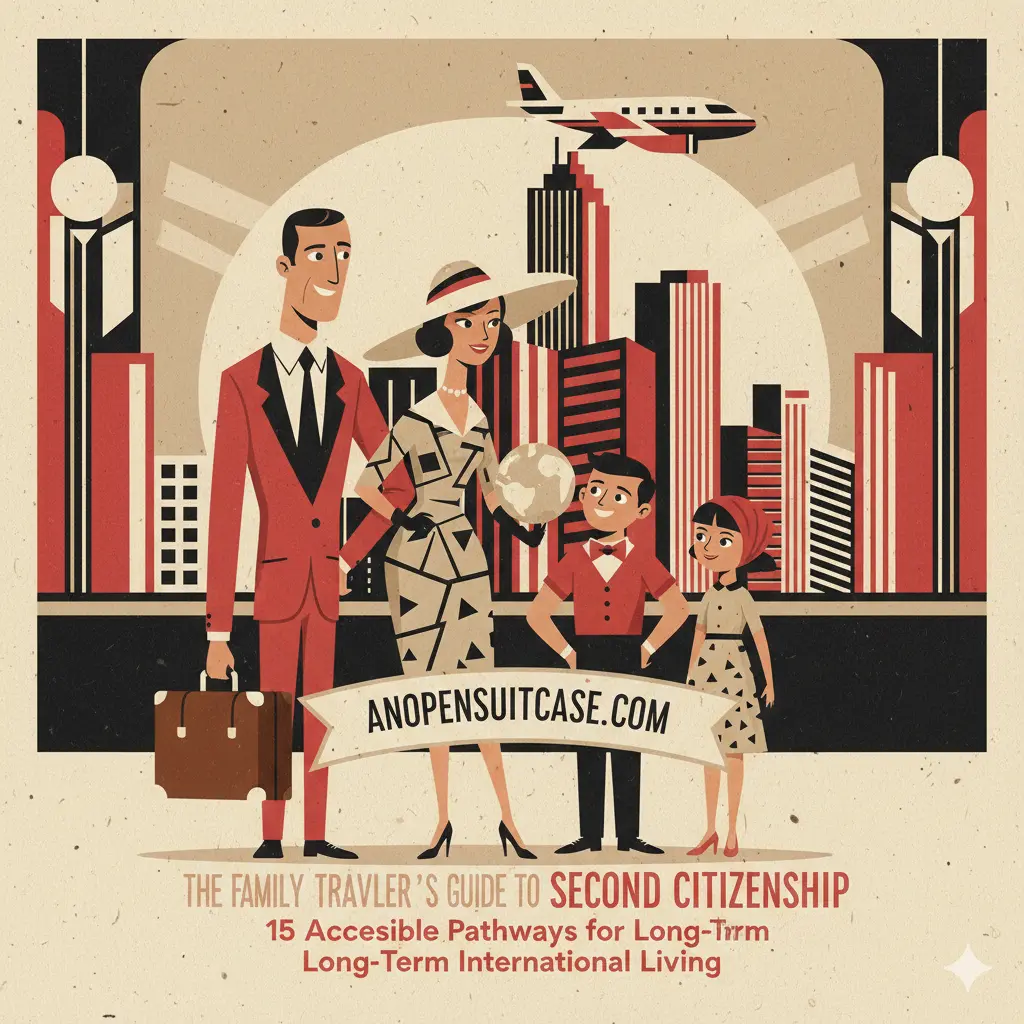The Family Traveler’s Guide to Second Citizenship: 15 Accessible Pathways for Long-Term International Living
When our family applied for Irish citizenship through my husband’s grandmother, we weren’t just collecting a second passport. We were opening doors…
When our family applied for Irish citizenship through my husband’s grandmother, we weren’t just collecting a second passport. We were opening doors we didn’t know existed.
Our kids – then ages 7 and 10 – could now attend university anywhere in the European Union at local tuition rates instead of international fees. We could live and work in 27 EU countries without visas or work permits. Future career opportunities expanded exponentially. And when global events disrupted travel in 2020-2021, having dual citizenship gave us options other families lacked.
For families committed to extended international travel or living abroad, second citizenship isn’t a luxury – it’s practical infrastructure that creates opportunities, reduces stress, and builds resilience across generations.
Why Families Pursue Second Citizenship (Beyond Passport Stamps)
Unlike solo travelers who might seek citizenship primarily for travel freedom, families have different motivations rooted in long-term planning and children’s futures.
- Educational access and affordability: EU citizenship transforms university costs. Germany, Norway, and several other European nations offer free or low-cost university education to EU citizens. A U.S. student might pay $200,000+ for a four-year degree; an EU citizen at a German public university pays minimal fees. For families with multiple children, this represents potential savings exceeding $500,000.
- Career flexibility for the next generation: Your children will enter adulthood with dual citizenship, expanding career options globally. EU citizenship allows working in 27 countries without visa sponsorship—making your kids far more attractive to multinational employers.
- Healthcare access: Many citizenship programs include access to national healthcare systems. Portuguese citizenship provides access to one of Europe’s most affordable healthcare systems. Irish citizenship includes healthcare rights across the EU through European Health Insurance Card.
- Generational wealth preservation: Some citizenship programs—particularly Caribbean citizenship by investment—offer tax advantages for families building wealth to pass to children. Zero capital gains tax, no inheritance tax, and territorial taxation systems can significantly impact generational wealth.
- Plan B for uncertain times: Political instability, economic crises, climate events, or pandemics demonstrate why having residence/citizenship rights in multiple countries provides security. Families watched in 2020 as some nationalities faced travel bans while others could move freely.
The Family Citizenship Decision Framework
According to immigration specialists at Global Citizen Solutions, families evaluate citizenship programs differently than individuals, prioritizing generational transfer, education access, and long-term residence rights over pure travel convenience.
Key family-specific considerations:
- Does citizenship automatically pass to children born after you obtain it?
- Can your current children be included in the application?
- Does the program allow citizenship to pass to future generations?
- What are education rights and costs for citizens?
- Are there military service requirements (important for families with sons in some countries)?
- Can you maintain your current citizenship (does the country allow dual citizenship)?

Easiest Citizenship Pathways for Families: Ranked by Effort and Timeline
TIER 1: Ancestry Citizenship (Fastest and Most Accessible)
Ireland – The Grandparent Connection
- Eligibility: One grandparent born in Ireland (before or after they left Ireland)
- Timeline: 8-18 months for processing
- Total cost: $1,000-2,500 (document fees, translations, legal help)
- Family benefit: Once you’re registered, your children can claim Irish citizenship. If you register before your children turn 18, they qualify. If you wait until after, they must go through the same grandparent registration process.
- Real example: The Morrison family from Seattle applied through the father’s Irish grandmother. After 14 months, all four family members received Irish passports. Their teenage daughter is now attending Trinity College Dublin at EU tuition rates (€6,000/year versus €21,000+ for non-EU students).
- Critical timing note: Don’t delay if you want to pass this to your children. If you have young kids, register yourself now to ensure they qualify automatically.
Italy – Unlimited Generational Depth
- Eligibility: Any Italian ancestor (great-great-great-grandparent counts!) if citizenship was never broken by naturalization
- Timeline: 2-4 years through consulates, or 6-18 months if you apply while living in Italy
- Total cost: $5,000-15,000 depending on generational complexity
- Family benefit: Once established, Italian citizenship passes automatically to all descendants forever. Your children, grandchildren, and great-grandchildren will be EU citizens.
- Real example: The Rodriguez family traced lineage back to a great-great-grandfather who emigrated from Sicily in 1898. He never naturalized in Argentina. After three years gathering documents across generations, the entire family (parents, three kids, and even grandmother) obtained Italian citizenship. All descendants now and forever are EU citizens.
- Why families love it: This is multigenerational wealth planning disguised as citizenship. You’re not just getting a passport; you’re establishing EU citizenship rights for your entire family tree.
Poland – Parents or Grandparents
- Eligibility: Parents or grandparents who were Polish citizens
- Timeline: 1-3 years
- Total cost: $3,000-7,000 with legal assistance
- Family benefit: Polish citizenship passes to children automatically
TIER 2: Citizenship by Investment (Money Buys Speed)
Caribbean Programs – Fast Family Citizenship
- Programs: St. Lucia, Dominica, Grenada, Antigua & Barbuda, St. Kitts & Nevis
- Investment: $150,000-$230,000 for family of four (via donation to government fund)
- Timeline: 4-6 months from application to passports in hand
- Family inclusion: Spouse and children under 18 included; some programs allow dependent children up to age 30 and dependent parents
- Real example: The Chen family (parents + 2 kids) obtained St. Lucia citizenship in 5 months for $190,000 total. Benefits: visa-free travel to 145+ countries including Schengen Europe and UK, zero income tax for their online business, and political diversification from their Hong Kong citizenship.
- Family-specific advantage: Children included at no additional cost beyond the family package rate. Your kids immediately gain strong passport for life.
- Education bonus: Several Caribbean nations have partnerships with offshore medical schools and universities offering special consideration for citizens—attractive for families with kids planning healthcare careers.
Portugal Golden Visa → Citizenship
Investment: €500,000 (investment funds or commercial real estate)
Timeline: 5 years residence → citizenship eligible
Physical presence: Just 7 days/year in Portugal
Total cost: €500,000 investment (often recoverable) + €10,000-20,000 fees over 5 years
Family inclusion: Spouse and children included in initial application at no additional cost
Real example: The Patel family invested €500,000 in a Portugal fund in 2019. They visited Portugal for one week annually, maintaining rental property in Lisbon. In 2024, they applied for citizenship. Their children—ages 8, 11, and 14 when they started—will receive Portuguese/EU passports in 2025 as teenagers, allowing them to attend university anywhere in the EU.
Why families choose it: This isn’t just a passport; it’s EU citizenship with all rights—live/work anywhere in 27 countries, access to European healthcare and education systems, and one of the world’s strongest passports (190+ countries visa-free).
TIER 3: Citizenship Through Residence (Time + Commitment)
Paraguay – Fastest South American Route
- Requirement: 3 years of residence
- Income requirement: $1,500/month passive income or savings
- Language: Spanish proficiency required
- Total cost: $8,000-12,000 over three years (legal fees, residence costs, living expenses)
- Timeline: 3 years minimum presence
- Family benefit: Spouse and children included in residence application; all eligible for citizenship after 3 years
- Real example: The Miller family relocated to Asunción when their kids were 9 and 12. Three years later, all four hold Paraguayan citizenship. Visa-free access to 140+ countries, Spanish fluency for the kids, and total costs under $40,000 for three years of living expenses plus legal fees.
- Why it works for families: Affordable, Spanish immersion for kids, manageable timeline, and genuine South American living experience.
Mexico – Popular Family Destination
- Timeline: 4-5 years (2 years temporary residence → 2-3 years permanent residence → citizenship eligible)
- Income requirement: $2,500-3,000/month
- Language: Spanish required for citizenship (B1 level)
- Cost: $10,000-15,000 over 5 years
- Family benefit: Mexican citizenship passes to children automatically
- Real example: The Anderson family moved to Mérida when their three kids were 5, 8, and 10. Five years later, all are fluent Spanish speakers holding dual U.S.-Mexican citizenship. The kids attended bilingual private school for $300/month per child. Total five-year living costs: $90,000 (half what they spent in California).
Panama Friendly Nations Visa
- Qualifying nationalities: 50+ countries including U.S., Canada, EU, Australia
- Requirement: $200,000 Panama real estate investment
- Timeline: 5 years → citizenship eligible
- Residency requirement: No minimum annual presence required (remarkably flexible)
- Family benefit: Entire family included
- Real example: The Garcia family purchased Panama City real estate for $250,000, establishing permanent residency. They continued living primarily in the U.S., visiting Panama 2-3 times yearly. After five years, they qualified for citizenship while their real estate appreciated to $340,000.
Family-Specific Considerations Often Overlooked
Citizenship transmission rules: Some countries pass citizenship automatically to children born after you naturalize, but not to children born before. Others include all existing children. Ireland and Italy include all descendants forever. Caribbean programs include children only if registered during your application.
Dual citizenship laws: Confirm your home country allows dual citizenship. U.S., Canada, UK, and most EU nations do. Some countries (China, India, Singapore) don’t, requiring you to renounce original citizenship.
Military service: Some countries (Israel, Greece, Armenia) have military service requirements. If you have sons, understand whether citizen children would face mandatory service.
Tax implications: U.S. citizens pay U.S. taxes on worldwide income regardless of where they live or what other citizenships they hold. Most other countries tax based on residence, not citizenship. Consult international tax specialists before proceeding.
Education timing: If your children are 14-15 years old and you want them to attend European university at citizen rates, start citizenship process NOW. Applications take years, and you need citizenship before university enrollment.
Practical Steps for Families
Step 1: Research ancestry thoroughly (1-2 weeks)
Interview grandparents and great-grandparents about family history. Order birth certificates for parents and grandparents. Many families discover qualifying heritage they didn’t know existed. This is your fastest, cheapest pathway if you qualify.
Step 2: Assess budget and timeline honestly (1 week)
Can you deploy $150,000-500,000 for investment programs? Or is the residence route (requiring actually living abroad for 3-5 years) more realistic? Budget and lifestyle preferences eliminate most options immediately.
Step 3: Consider children’s ages (Ongoing)
If your kids are young (under 10), you have flexibility. If they’re teenagers, timing becomes critical for university access and citizenship transmission rules.
Step 4: Evaluate language commitment (Ongoing)
Spanish opens Mexico, Paraguay, Panama, and Spain. Portuguese works for Portugal. No language skills required for ancestry programs or most Caribbean options.
Step 5: Consult specialists (Before investing money)
Immigration attorneys ($3,000-10,000) prevent costly mistakes. International tax advisors ($2,000-5,000) help you understand tax implications. Citizenship specialists ($1,500-5,000) guide ancestry applications. These costs pay for themselves by avoiding errors.
Step 6: Join family expat communities (Immediate)
Facebook groups: “Dual Citizenship Families,” “EU Citizenship for Americans,” country-specific expat family groups. Current participants share updated processing times, document requirements, and pitfalls official sources never mention.
The Bottom Line for Traveling Families
Second citizenship isn’t about escaping your home country—it’s about creating options for your children’s futures. EU citizenship could save $200,000+ in university costs. Caribbean citizenship provides tax optimization for family businesses. Ancestry citizenship costs $2,000 and transforms your family’s opportunities for generations.
For families committed to international living or simply wanting to provide children with maximum future flexibility, exploring citizenship programs is among the highest-return time investments you can make.
Your children will thank you when they’re 22, holding two passports, choosing between career opportunities across multiple continents, and wondering why all their friends don’t have the same options.
Disclaimer: Citizenship and immigration laws change frequently. This article provides general information based on 2025 data. Consult licensed immigration attorneys and tax professionals for advice specific to your family’s situation before making decisions.
